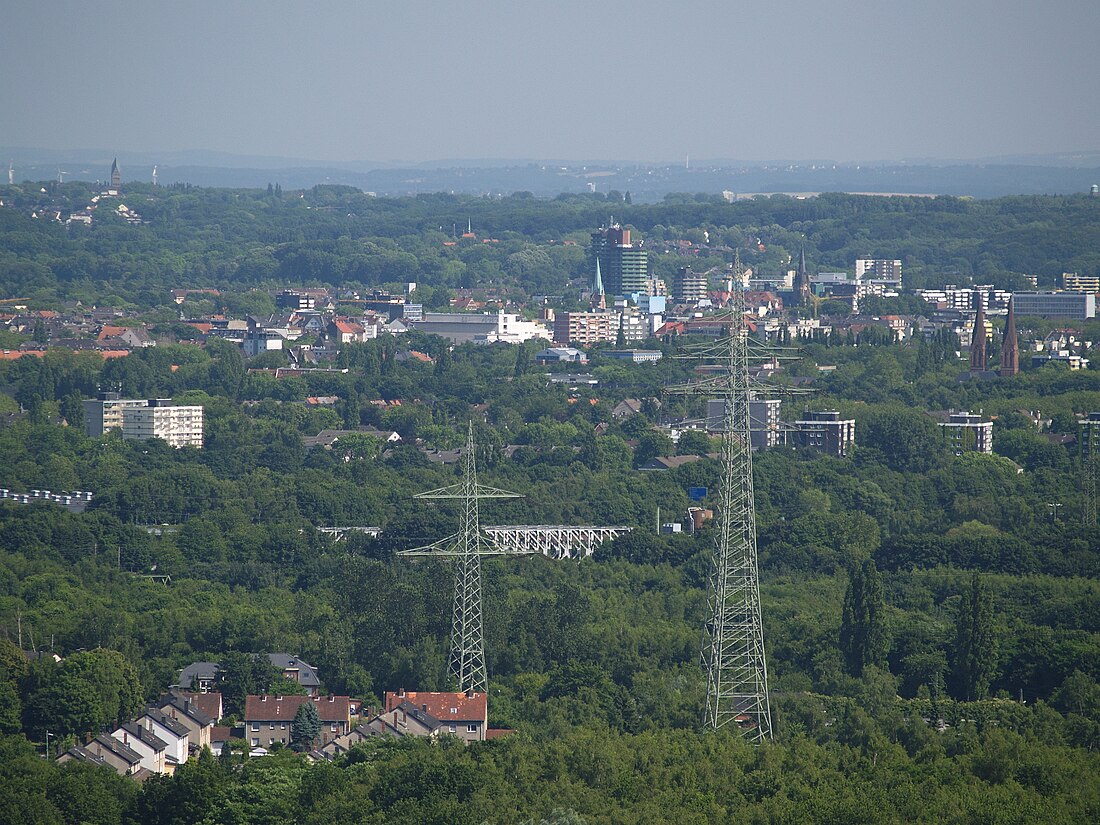Top Qs
Timeline
Chat
Perspective
Herne, North Rhine-Westphalia
City in North Rhine-Westphalia, Germany From Wikipedia, the free encyclopedia
Remove ads
Herne (German pronunciation: [ˈhɛʁnə] ⓘ) is a city in North Rhine-Westphalia, Germany. It is located in the Ruhr area directly between the cities of Bochum, and Gelsenkirchen.
This article needs additional citations for verification. (August 2013) |
Remove ads
History
Summarize
Perspective
Herne (ancient Haranni)[3] was a tiny village until the 19th century. When the mining of coal (and possibly ore) and the production of coke (the fuel processed from the harvested coal) and steel began, the villages of the Ruhr area had an influx of people, mostly from the east of Germany.
Herne is located on the direct axis between Bochum to the south and Recklinghausen to the north, with Münster in the north, Gelsenkirchen to the west, and Castrop-Rauxel and Dortmund to the east. The physical border between Herne and Recklinghausen is the bridge at the Bochumer Strasse across the Rhine–Herne Canal. A little further north of the canal flows the Emscher river, with the former abundance of wild horses that were caught in the Emscher Valley (Emschertal), then sold and/or traded at the yearly horse market at Crange, which later developed into the "Cranger Kirmes".[4] After World War II, Herne was known as "Die Goldene Stadt" ("The Golden City") because of the comparatively limited damage suffered during World War II.[5]
World War II
Herne was targeted by the Royal Air Force in June 1940, early in World War II, two residents died and there was minor property damage.[6] The Krupp Treibstoffwerke oil refinery near the local Shamrock, ¾ of the coal mine, was bombed during the oil campaign of World War II.[7]
On 31 March 1945, the Wehrmacht destroyed the bridges over the Rhine–Herne Canal and the Emscher and fighting occurred in the area. On April 9, 1945, American troops entered and occupied Herne. German forces had already been evacuated from the city the previous day.[6]
Present day
Present-day Herne includes the former settlements of Haranni, originating at the south end of the Bahnhofstrasse and just across the Evangelische Hauptkirche Herne (main Lutheran Church—seems to be called "Kreuzkirche" now) and the crossing of Sodingerstrasse, running to the east at that point, then turning into Wiescherstrasse; formerly independent settlements or villages like Baukau, Börnig, Crange, Horsthausen, Pöppinghausen, Sodingen, and others became the present Herne. These farms bearing these names were probably or possibly found in the 11th and 12th centuries. In 1860, the first of a number of coal mines started operating. In the following thirty years, the population increased twenty-fold. In 1975, Wanne-Eickel, by then a city with over 70,000 inhabitants, was incorporated into Herne, which had a population larger than "Wanne-Eickel" at that point in time.[8][9]
Remove ads
Politics
Summarize
Perspective
Mayor
The current mayor of Herne is Frank Dudda of the Social Democratic Party (SPD), elected in 2015 and re-elected in 2020. The most recent mayoral election was held on 13 September 2020, and the results were as follows:
City council

The Herne city council governs the city alongside the mayor. The most recent city council election was held on 13 September 2020, and the results were as follows:
Remove ads
Gallery
- Herne, church
- Baukau, castle: Schloss Strünkede
- Baukau, chapel: Schlosskapelle Strünkede
The largest communities of migrants:
| 10,130 | |
| 2,139 | |
| 1,865 | |
| 1,140 | |
| 1,066 | |
| 792 |
Notable places
A fair called Cranger Kirmes is held in the city's Crange district every first week of August. This is the second largest-carnival in Germany, with an average of around 4.5 million visitors. Its origins can be traced back to the 15th century, when farmers started trading horses on Saint Lawrence's Day. The horse show and horse equipment sales were arranged at the same place where horses were traded years ago for tradition.
Remove ads
Notable people
Famous Hernians or Wanne-Eickelians include:
- Cigdem Akyol
- Yıldıray Baştürk
- Kurt Edelhagen
- Gudrun Heute-Bluhm
- Andrea Jürgens
- Jürgen von Manger, known as "Mr. Tegtmeier", Tegtmeiers Reisen
- Jürgen Marcus
- Bernd Storck
- Peavy Wagner
- Leonie Saint
- Bärbel Beuermann
- Gregor Willmes, musicologist
- Rudolf Witzig
- Jan Zweyer
Notable business
This section needs expansion. You can help by adding to it. (December 2023) |
Major industrial employers in Herne are Schwing (manufacturer of concrete pumps), Vulkan (couplings and connections for refrigeration and air conditioning) and the construction company Heitkamp.
Herne is the location of two renowned hospitals of supraregional importance, the Rheumazentrum Ruhrgebiet (rheumatology specialist clinic) with a center for rare diseases,[10] and the Urology Clinic[11] at the Marien-Hospital, one of the leading clinics for tumor therapy, neuro-urology, uro-gynecology, andrology and incontinence therapy. Both clinics are affiliated with the Ruhr University Bochum.
Remove ads
Sports
Herne is home to several football clubs, including SC Westfalia Herne, DSC Wanne-Eickel and SV Sodingen. The city's soccer tradition is closely linked to the mining industry. The clubs celebrated their greatest successes in the 1950s.[12]
Sister cities
 Hénin-Beaumont, France (1954)
Hénin-Beaumont, France (1954) Castleford, England, United Kingdom (1956)
Castleford, England, United Kingdom (1956) Altagracia, Nicaragua (1988)
Altagracia, Nicaragua (1988) Moyogalpa, Nicaragua (1988)
Moyogalpa, Nicaragua (1988) Belgorod, Russia (1990)
Belgorod, Russia (1990) Eisleben, Germany (1990)
Eisleben, Germany (1990) Konin, Poland (1991)
Konin, Poland (1991) Beşiktaş, Turkey (2016)
Beşiktaş, Turkey (2016) Luzhou, China (2018)[14]
Luzhou, China (2018)[14]
References
External links
Wikiwand - on
Seamless Wikipedia browsing. On steroids.
Remove ads









